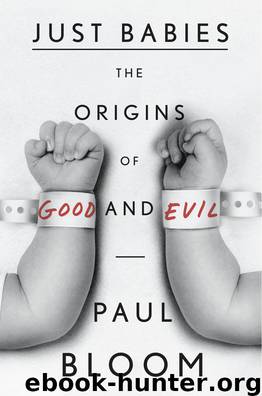Just Babies by Paul Bloom

Author:Paul Bloom [Bloom, Paul]
Language: eng
Format: epub
ISBN: 978-0-307-88686-6
Publisher: Crown Publishing Group
Published: 2013-11-11T16:00:00+00:00
CHARLES Darwin, always an astute observer of human nature, tells the story of his own disgust. In Tierra del Fuego, he writes, “a native touched with his finger some cold preserved meat which I was eating at our bivouac, and plainly showed disgust at its softness; whilst I felt utter disgust at my food being touched by a naked savage, though his hands did not appear dirty.”
People can be disgusting. If it’s true that disgust evolved in part to prevent disease, then the disgustingness of people follows naturally—we are disease vectors. But we are disgusting in a more basic way. We are fleshy things and we are associated with all of the substances that elicit core disgust. “Inter faeces et uriam mascimur,” in the words of Saint Augustine—We are born between urine and feces.
Disgust may be morally neutral when elicited by a dead rat or a puddle of vomit, but disgust at our fellow human beings is more troubling. Now, disgust is not identical to repulsion or hatred. You can hate someone who doesn’t disgust you at all in a visceral sense—though there is often the temptation to use the rhetoric of disgust toward those we despise: “He makes me sick!” And you can feel disgust without hatred, repulsion, or any sort of negative feeling at all. Changing your child’s diaper or cleaning up her vomit might be revolting, but it doesn’t make you hate your child. Still, disgust ups the odds. To be grossed out by someone is, other things being equal, to be repelled by him.
Disgust is the opposite of empathy. Just as empathy leads to compassion in many (but not all) circumstances, disgust usually (but not always) leads to repulsion. Empathy triggers an appreciation of another’s personhood; disgust leads you to construe the other as diminished and revolting, lacking humanity.
Experimental research shows that feelings of disgust make us judge others more harshly. In the first experiment along these lines, the psychologists Thalia Wheatley and Jonathan Haidt hypnotized participants to feel a flash of disgust whenever they saw an arbitrary word. When the participants later read stories of a mild moral transgression, those who saw the word rated the behavior as more immoral than those who didn’t. In other experiments, participants were asked to make judgments at a messy, disgusting desk; or in a room that had been blasted with a fart spray; or after being shown a scene from the movie Trainspotting in which a character puts his hand into a feces-filled toilet; or after being asked to write about a disgusting experience. All of these situations made the participants more morally disapproving about the acts of other people. Even eating a bitter food, which evokes a sensation akin to physical disgust, makes people harsher toward moral transgressions. And consistent with these experimental findings, individuals with high disgust sensitivity have harsher attitudes toward certain other people, such as immigrants and foreigners.
The consensus from the world and from the lab is clear: disgust makes us meaner.
Download
This site does not store any files on its server. We only index and link to content provided by other sites. Please contact the content providers to delete copyright contents if any and email us, we'll remove relevant links or contents immediately.
Rewire Your Anxious Brain by Catherine M. Pittman(17621)
Talking to Strangers by Malcolm Gladwell(11960)
The Art of Thinking Clearly by Rolf Dobelli(8902)
Mindhunter: Inside the FBI's Elite Serial Crime Unit by John E. Douglas & Mark Olshaker(7878)
Becoming Supernatural by Dr. Joe Dispenza(7144)
Change Your Questions, Change Your Life by Marilee Adams(6687)
The Road Less Traveled by M. Scott Peck(6672)
Nudge - Improving Decisions about Health, Wealth, and Happiness by Thaler Sunstein(6669)
The Lost Art of Listening by Michael P. Nichols(6514)
Enlightenment Now: The Case for Reason, Science, Humanism, and Progress by Steven Pinker(6436)
Win Bigly by Scott Adams(6345)
Mastermind: How to Think Like Sherlock Holmes by Maria Konnikova(6280)
The Way of Zen by Alan W. Watts(5830)
Daring Greatly by Brene Brown(5680)
Big Magic: Creative Living Beyond Fear by Elizabeth Gilbert(4765)
Grit by Angela Duckworth(4761)
Men In Love by Nancy Friday(4369)
Flow by Mihaly Csikszentmihalyi(4081)
The Four Tendencies by Gretchen Rubin(4044)
